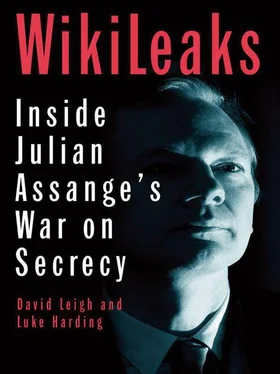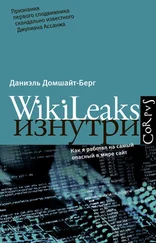Harding, Luke - WikiLeaks - Inside Julian Assange's War on Secrecy
Здесь есть возможность читать онлайн «Harding, Luke - WikiLeaks - Inside Julian Assange's War on Secrecy» весь текст электронной книги совершенно бесплатно (целиком полную версию без сокращений). В некоторых случаях можно слушать аудио, скачать через торрент в формате fb2 и присутствует краткое содержание. Жанр: Старинная литература, на английском языке. Описание произведения, (предисловие) а так же отзывы посетителей доступны на портале библиотеки ЛибКат.
- Название:WikiLeaks: Inside Julian Assange's War on Secrecy
- Автор:
- Жанр:
- Год:неизвестен
- ISBN:нет данных
- Рейтинг книги:3 / 5. Голосов: 1
-
Избранное:Добавить в избранное
- Отзывы:
-
Ваша оценка:
- 60
- 1
- 2
- 3
- 4
- 5
WikiLeaks: Inside Julian Assange's War on Secrecy: краткое содержание, описание и аннотация
Предлагаем к чтению аннотацию, описание, краткое содержание или предисловие (зависит от того, что написал сам автор книги «WikiLeaks: Inside Julian Assange's War on Secrecy»). Если вы не нашли необходимую информацию о книге — напишите в комментариях, мы постараемся отыскать её.
WikiLeaks: Inside Julian Assange's War on Secrecy — читать онлайн бесплатно полную книгу (весь текст) целиком
Ниже представлен текст книги, разбитый по страницам. Система сохранения места последней прочитанной страницы, позволяет с удобством читать онлайн бесплатно книгу «WikiLeaks: Inside Julian Assange's War on Secrecy», без необходимости каждый раз заново искать на чём Вы остановились. Поставьте закладку, и сможете в любой момент перейти на страницу, на которой закончили чтение.
Интервал:
Закладка:
There were further concerns. The full text of relevant cables was intended to be posted online alongside individual news stories. This practice – what Assange called “scientific journalism” – was something the Guardian and some other papers had now been routinely doing for several years, ever since the technology had made it possible.
Each reporter was now made responsible for “redacting” their own cables – blanking out from the original any sources who might have been put at risk if their names were published. Heads of state, well-known politicians, those in public life generally, were fair game as a rule. In some parts of the world, however – the Middle East, Russia and central Asia, Iraq, Afghanistan and Pakistan – to be seen even talking to the Americans was a risky proposition.
The cables team took a conservative approach. If there was seen to be a risk of someone being compromised, then the name was scrubbed out. This was at times frustrating: long, informative cables might be stripped down to a couple of dull paragraphs. But the alternative was far worse. Redactions were passed on to Jonathan Casson, the paper’s apparently miracle-working head of production, and his harassed-looking team, who set up camp in a neighbouring fourth-floor room normally used as a training suite. Rusbridger had suggested early on that each paper nominate a “redactions editor” to ensure a belt and braces approach to protecting sources. Now Casson worked brutally long days comparing the Guardian ’s editing decisions with those of his counterparts, and considering the representations about particular cables from the US state department that were passed on by the New York Times . The task was made vastly more difficult by the journalists’ determination not to discuss cables on the phone or in emails; after his daily round of Skype calls with international partners, Casson would meticulously alter the colour of some of the 700 or so cables listed on a vast Google spreadsheet that only he could understand. He looked like a man close to the edge.
And then there were the legal risks. Could the Guardian be prosecuted under the British Official Secrets Act or the US Espionage Act? And, if so, would it have to hand over internal documents and emails? Rusbridger had already sought the opinion of Alex Bailin, a QC who specialised in secrecy law, ahead of publication of the Afghan war logs. There had been no prosecution. But this did not mean that the White House would necessarily acquiesce in the far more damaging publication of the secret US state department cables.
Geraldine Proudler, of the Guardian ’s law firm, Olswang, had been full of forebodings. Ahead of the publication of the Afghanistan and Iraq war logs she suggested it was “entirely possible” the US could bring a prosecution against the Guardian under the Espionage Act – though an all-out assault against the international media partners seemed unlikely. It was also possible the Americans could seek to lay hands on Rusbridger. “In a worst case scenario we cannot rule out extradition attempts.” At the least, it was “very likely” that the US might serve a subpoena demanding that the Guardian hand over material after publication, she had advised.
In addition to worrying about the risks of possible injunctions under the Official Secrets Act and the Espionage Act, Gill Phillips, the Guardian ’s in-house head of legal, spent many hours weighing up the libel and privacy dangers: both were big problems domestically, because the UK lacked the free speech protections enshrined in the US constitution. The cables were fascinating, and credible as documents. They revealed international skullduggery and double-dealing, among other things. But the fact they had been written by US diplomats didn’t make them libel proof. Some of the cables from the former Soviet Union, Pakistan and Afghanistan made eye-popping assertions of top-level corruption, but could they land the Guardian with a costly writ? All had to be handled with care.
To a certain degree, Phillips could rely on the Reynolds defence, following a celebrated 1999 ruling that journalists were able to publish important allegations that could not be proved, so long as the material was in the public interest, the paper acted responsibly, and it followed proper journalistic procedures. (The case got its name after Albert Reynolds, the Irish premier, sued the London Sunday Times .) But the Reynolds judgment wasn’t a Get Out of Jail Free card; in some cases the Guardian had still, if necessary, to be able to prove in court the truth of what it had published.
Silvio Berlusconi was a case in point. The cables alleged that the controversial Italian prime minister had profited “personally and handsomely” from a close – the cables said too close – relationship with Vladimir Putin, Russia’s prime minister and former president. But might Berlusconi sue the Guardian in Rome, Phillips wondered? In the event, the Italian papers beat the Guardian to that one, and sprayed the detailed allegations all over the world.
There were further considerations. Responsible journalists normally approach the person they are writing about before publication, giving them the opportunity for comment or even rebuttal. In this case, however, there was a big danger in going too soon. That would reveal the Guardian possessed the cables: the other, alerted party could immediately seek an injunction, on the grounds that the paper was in unlawful possession of confidential documents. A sweeping UK gag order could be disastrous for the Guardian ’s journalism: it might scupper their entire cables project.
Phillips, and Jan Thompson, the Guardian ’s managing editor, held rambunctious meetings with the battle-scarred Leigh. His objective was to publish the best stories possible. The equally experienced lawyer’s task was to keep the paper out of the courts and the editor out of jail. Leigh proposed what he thought were ingenious solutions to libel problems. Sometimes the lawyer agreed. It was a very fine line. “We were incredibly careful legally, and responsible,” Phillips says. But “legalling” the Guardian ’s cable stories was “exhilarating”, she adds. “You got completely sucked in. Suddenly you find yourself becoming an expert on all the world’s governments.” Phillips felt confident in the end. She nevertheless arranged for both a QC and junior barrister to be on stand-by on the evening of the planned cables launch. Legal opponents had been known in the past to wake up British judges, fully prepared to issue gag orders against the Guardian , even in their pyjamas.
There was a final grand conference in London of all the parties on Thursday 11 November to fine-tune the elaborate publication grid of day-by-day cable stories. Assange arrived in the Guardian offices rigged out this time in chief executive style, with a sharp, well-fitting blue suit. His Australian lawyer Jennifer Robinson was by his side. Representatives from Der Spiegel , El País , and Le Monde had flown in, together with Ian Fisher, a deputy foreign editor with the New York Times . In contrast to the difficult atmosphere at the last meeting, Assange was a model of bonhomie and charm; Leigh, with whom he had previously had some angry words, decided to be absent with what some suspected to be a case of diplomatic flu. The meeting went surprisingly smoothly.
Afterwards, the partners again headed for dinner in the Rotunda restaurant beneath the Guardian offices. Here, as the journalists sank pints of Pilsner Urquell, Assange confided he was thinking about going to Russia. Russia was an odd choice – especially in the light of soon-to-be-published cables that described it as a “virtual mafia state”. He did not disclose, however, details of the relationship he had privately struck up with WikiLeaks’ new “Russian representative”, the bizarre figure of Israel Shamir.
Читать дальшеИнтервал:
Закладка:
Похожие книги на «WikiLeaks: Inside Julian Assange's War on Secrecy»
Представляем Вашему вниманию похожие книги на «WikiLeaks: Inside Julian Assange's War on Secrecy» списком для выбора. Мы отобрали схожую по названию и смыслу литературу в надежде предоставить читателям больше вариантов отыскать новые, интересные, ещё непрочитанные произведения.
Обсуждение, отзывы о книге «WikiLeaks: Inside Julian Assange's War on Secrecy» и просто собственные мнения читателей. Оставьте ваши комментарии, напишите, что Вы думаете о произведении, его смысле или главных героях. Укажите что конкретно понравилось, а что нет, и почему Вы так считаете.












